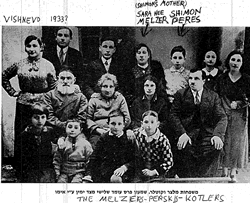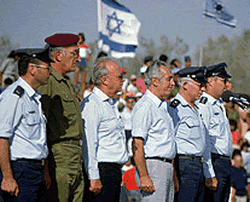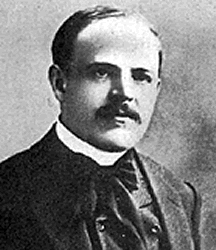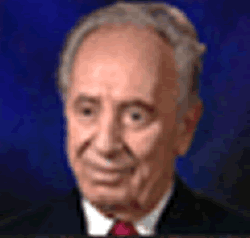
http://www.achievement.org/autodoc/page/per0int-1
Let's begin with your childhood, before you emigrated to Israel. What do you remember of your European childhood? Where were you born?
Return to Vishnevo Stories Menu
Academy of Achievement: Shimon
Peres Interview; May 2, 2003
Washington, D.C.

http://www.achievement.org/autodoc/page/per0int-1
Let's begin with your childhood, before you emigrated to Israel. What do you
remember of your European childhood? Where were you born?
I was born in a small Jewish shtetl
(Vishnevo) that -- during (Should say between the two wars) the two wars, the
first and the second it was under Polish control -- but otherwise it was Belarus.
Russians. And they hated the Poles. They wouldn't speak the language. The place
I was born was a very small place, totally Jewish, and we were living neither
in Poland nor in Russia.
We were living in Israel from the day I was born, even before emigrating.
It was the dream of Israel?

It was the dream. I went to a Hebrew school. At our home, we spoke three languages:
Hebrew, Yiddish and Russian. In my family (Perski), we have had members of the
Likud (Bitar) and members of the left (Hashomer Hatzair). There was a very vivid
argument going on all the time. I remember myself as a totally independent boy.
Did you have brothers and sisters?
Yes. I have a brother younger than me (Gershon). My mother (Sarah nee Meltzer)
was a librarian, so from her, I got the taste to read. You wouldn't believe
it, but by the age of nine, I had already read Dostoyevsky's Crime and Punishment.
I couldn't sleep at night; it bothered me tremendously. I think I was living
in my imagination much more than I was living in my realities. I was a reader.
I was a dreamer.
What other books do you remember from that era?

Probably the most known is Sholem Aleichem, but there were others. There were
many Hebrew books. There was one that Avraham Mapu wrote about the future of
Israel. There were good boys and bad boys. The good boys were clearly Zionist.
I was on his side, he was on my side. We had a total agreement. My grandfather
(Zvi- Hirsh Meltzer) educated me, basically. He studied in a yeshiva. You know
what a yeshiva is? A yeshiva is sort of a rabbinical seminary, but not with
all the formalities. They study the Talmud and the Mishnah and the Bible. My
grandfather and my father were born in Volozhin, home of the most famous Yeshiva
in Jewish life.

My grandfather studied together with our greatest poet, by the name of Chaim
Nachman Bialik, who is considered our national poet to this very day. And from
him, I learned the Talmud, the Bible.
As a young boy, he taught me every day a page of the Talmud......
I was under his spell. He was a rabbi. I was extremely religious when I was
a young boy. It's only when I emigrated to Israel that I divorced my orthodox
behavior and concept and changed my dress. I changed my eyes, I changed my outlooks,
I changed my behavior. It was like moving from one world to another world, except
for one thing, for the love of Israel, for the knowledge of the Hebrew language.
That was my world.
Your town, your shtetl, what was it like?
Our shtetl (Vishnevo) was 100 kilometers south of Minsk (should say west of
Minsk), which is the capital of Belarus. There were, I think, a thousand Jewish
families (should say about a thousand Jewish people), no non-Jewish persons
there. There were two synagogues, built of wood. There was a Hebrew school that
we attended. There were Israeli political parties with branches there. Like
it's common among the Jewish people, we were deeply divided, and we loved the
division. Highly polemic and argumentative.
I came to Israel when I was 11 years old. I thought I was a prepared Israeli,
but Israel was a total surprise. First of all, the place I came from had gray
skies. I never saw a blue sky really in Belarus. It was half-wintery all year
round. It had a river that I took for granted. The trees were high and powerful.
We were surrounded by a forest. We never knew what was behind the forest. We
know that behind the forest, there were non-Jewish people that don't like us.
Were there pogroms?
No, but...
There was one occasion when I was very young -- eight years or seven years old
-- that Jewish businessmen went through the forest, and they were assassinated.
And that was for the first time I saw in our paper where there were assassinations
in our place. I saw the story of assassination. It bothered me greatly. We have
had a happy childhood. My family was well-to-do. We didn't have electricity.
We had a radio operated on batteries which I destroyed, because my parents used
it on shabbat, on Saturday, and I was so religious that I would not permit it
to happen.
You were more religious than your parents?
Oh, by far, by far. I was as religious as my grandfather, and they were already
more secular, as were many of the others.
You started in politics when you were very young. What inspired you to get involved
at such a young age?
I don't think I made a major choice to become a politician.
When I was a young man in Israel, our major goal ideologically and otherwise
was to become farmers, members of a kibbutz.
So I joined in a youth movement that sent me to an agricultural school where
I got my main education. There, we organized a small nucleus of boys and girls
to go and build a kibbutz, and we went to build a kibbutz, but while doing all
this, at school and later on at the kibbutz, there was a great debate taking
place in Israel on two major issues. One, who represents the world of tomorrow?
The Socialists? The Communists? The Soviet Union, or the democracy, the free
world? And what actually does stem from our ideology? .....
For the rest go to;
http://www.achievement.org/autodoc/page/per0int-1